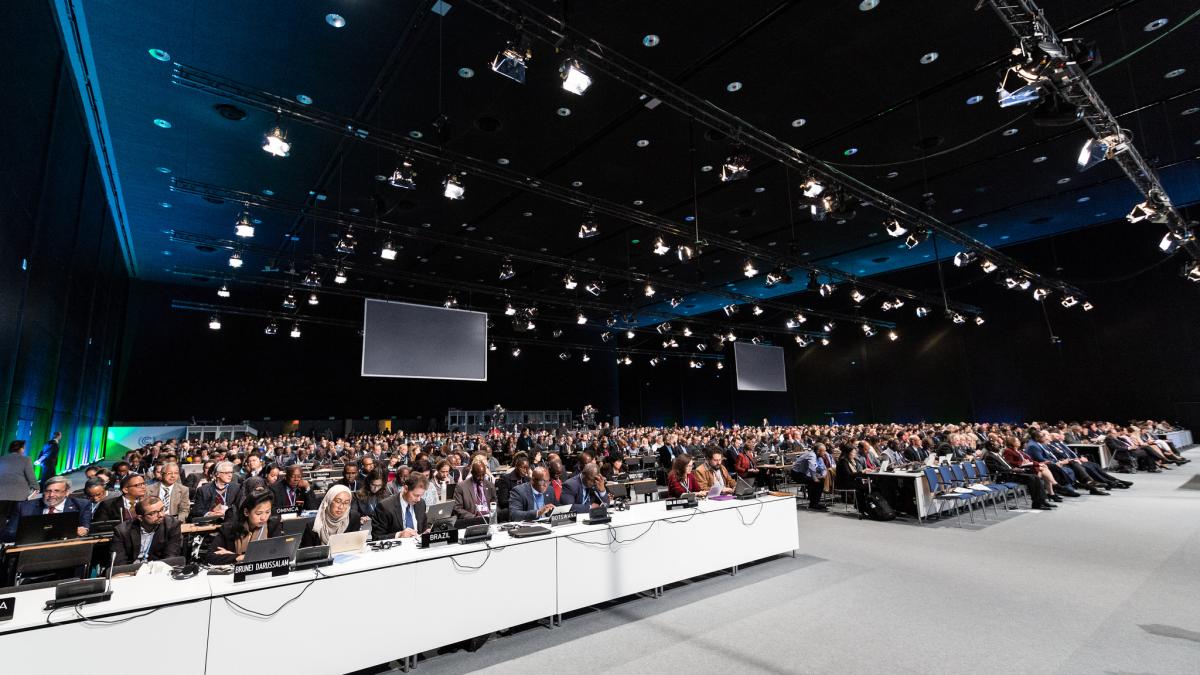COP24 blog - Germany drops in climate performance
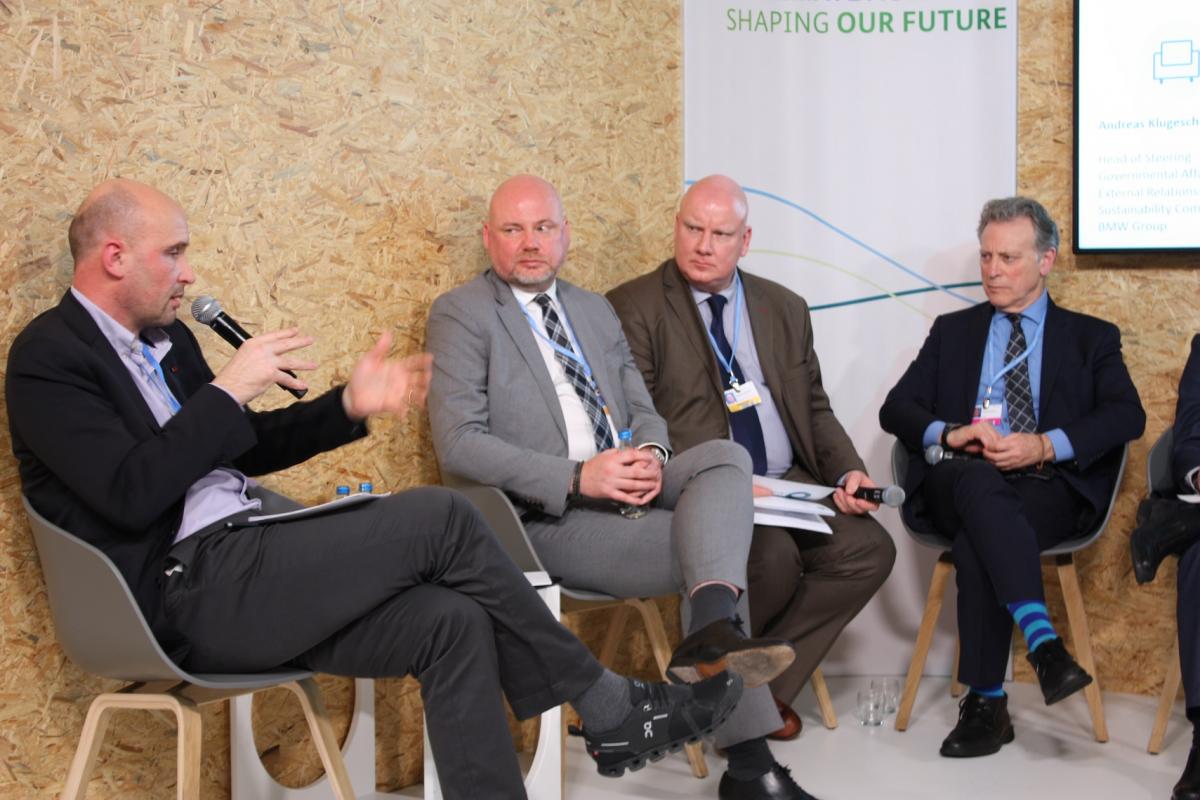
Transport task force report delayed to early 2019 – German negotiator
Germany’s National Platform Future of Mobility (NPM) – the government-initiated task force to make proposals on how to clean up the country’s transport sector – will publish its strategy on the “future of affordable and sustainable mobility” in early 2019, said German climate negotiator Carsten Sach. Originally, the platform was supposed to publish the report by the end of 2018. [Read more about the NPM in Clean Energy Wire’s factsheet]
At a panel discussion organised by think tank Agora Verkehrswende*, Sach said that reaching climate targets in German transport was probably the most difficult compared to other sectors. However, the country had a strong incentive to comply, as it would have to buy its way out, should it miss the European climate goal in transport, a sector not covered by the European Union Emissions Trading System (ETS). “We should rather invest in Germany than in other countries’ [allowances],” said Sach.
At the event, Agora Verkehrswende head Christian Hochfeld said that cities will be the game changer in the global mobility transformation. Introducing electric vehicles in 25 cities worldwide would mean the breakthrough for the technology, he said.
*Like the Clean Energy Wire, Agora Verkehrswende is a project funded jointly by the Mercator Foundation and European Climate Foundation.
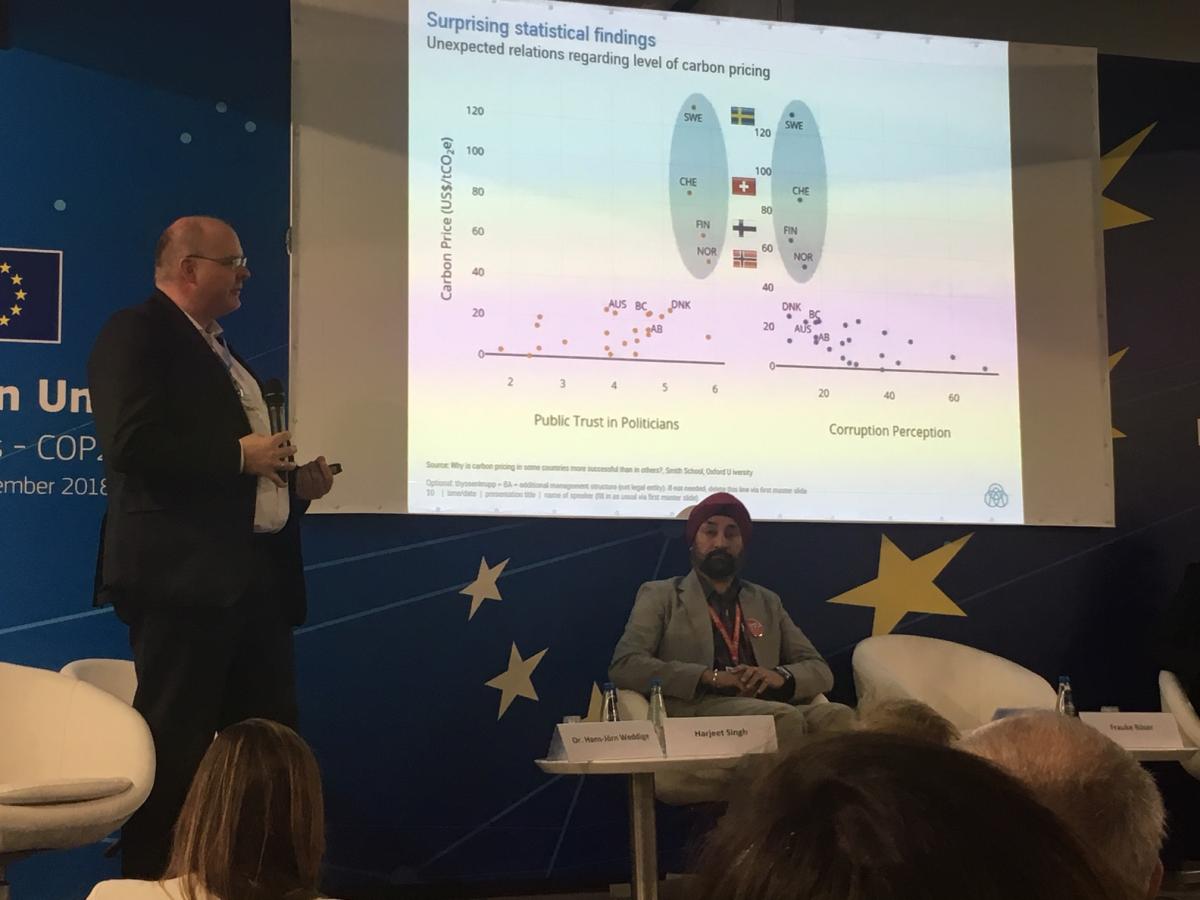
Climate finance needs trust and trust needs time to build
Financing the shift to a low-carbon economy and providing money to support countries already affected by the climate crisis needs trust among all involved, the head of energy & climate policy at steelmaker ThyssenKrupp, Hans-Jörn Weddige said at a side event on “shifting the trillions” for climate finance. Weddige presented a chart showing a correlation between the public’s trust in a country’s politicians and the level of carbon pricing there. Like with any paper currency, stakeholders needed to come to trust each other, which takes time and makes events like the COP or Germany’s commission to find a consensus on how to end coal-fired power generation indispensable.
How much priorities varied on climate finance became apparent during the talks at the EU pavilion:, While Weddige highlighted the need to support companies in their shift towards carbon-free production, Harjeet Singh from Action Aid International stressed the need to support those countries suffering from climate change already. At least in the finance sector itself, some new thinking was slowly taking hold said DZ Bank’s head of sustainable investment research, Marcus Pratsch. “When I started 15 years ago in sustainable finance people looked at me as if I were an alien,” he said. “Now, there is the thinking in more and more banks that economic growth is an incomplete factor for wellbeing.”
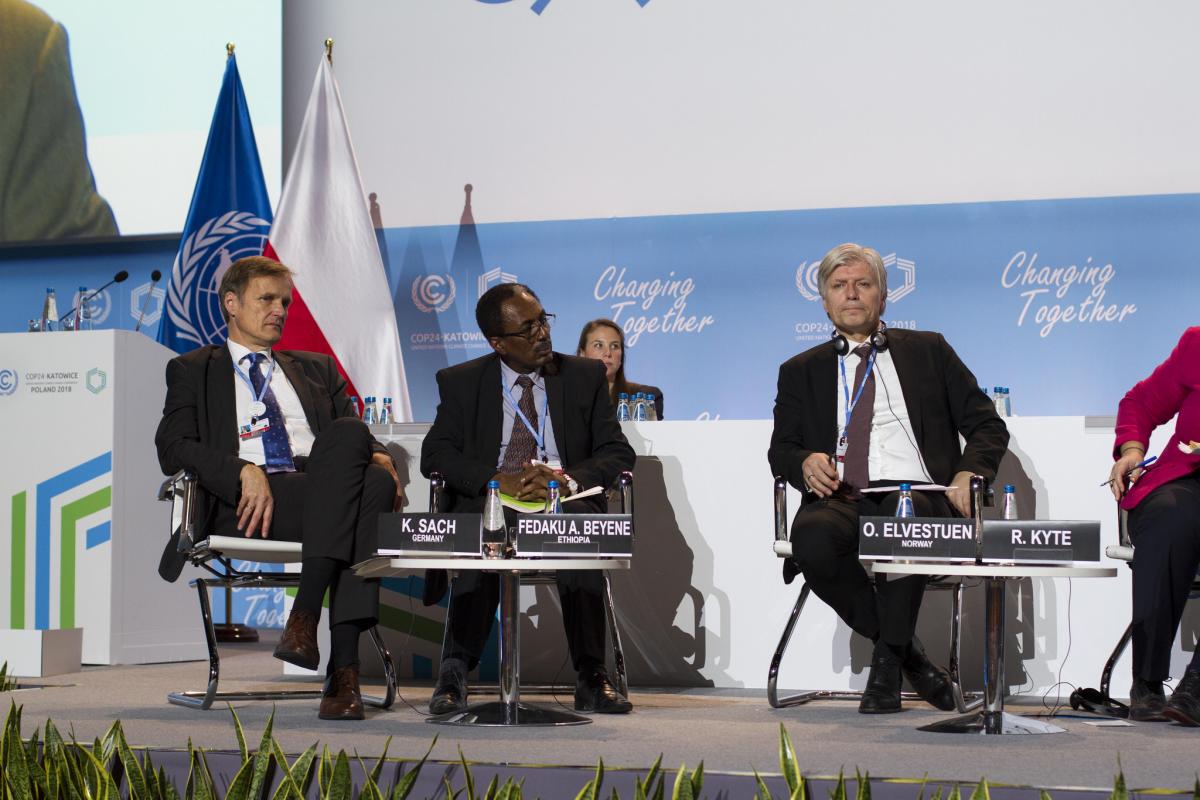
COP-veteran Jochen Flasbarth to consult on climate finance
Climate finance is a subject close to the German delegation’s heart: The country's climate diplomats have long held the view that it can open doors in the talks because developing nations are often in dire need of financial support. Last week, the German development ministry officially announced the doubling of its contributions to the Green Climate Fund and as head negotiator Karsten Sach emphasised the country is also on track when it comes to fulfilling (and probably over-achieving) Chancellor Angela Merkel’s 2014 promise to double its public climate finance contributions from 2 to 4 billion Euros by 2020.
Sach’s boss in the environment ministry, state secretary Jochen Flasbarth, will co-consult on climate finance on behalf of the Polish COP-presidency. Sach said during the high-level meeting of the pre-2020 stocktake that ever since Paris, the understanding of how public and private finance go hand in hand had grown and with it the notion that “we won’t reach the Paris targets if we don’t combine public and private finance flows”. In order to make the funding mechanism better, donor countries had to know what developing countries needed to fight global warming at home and what it took for them to take ownership of the process.
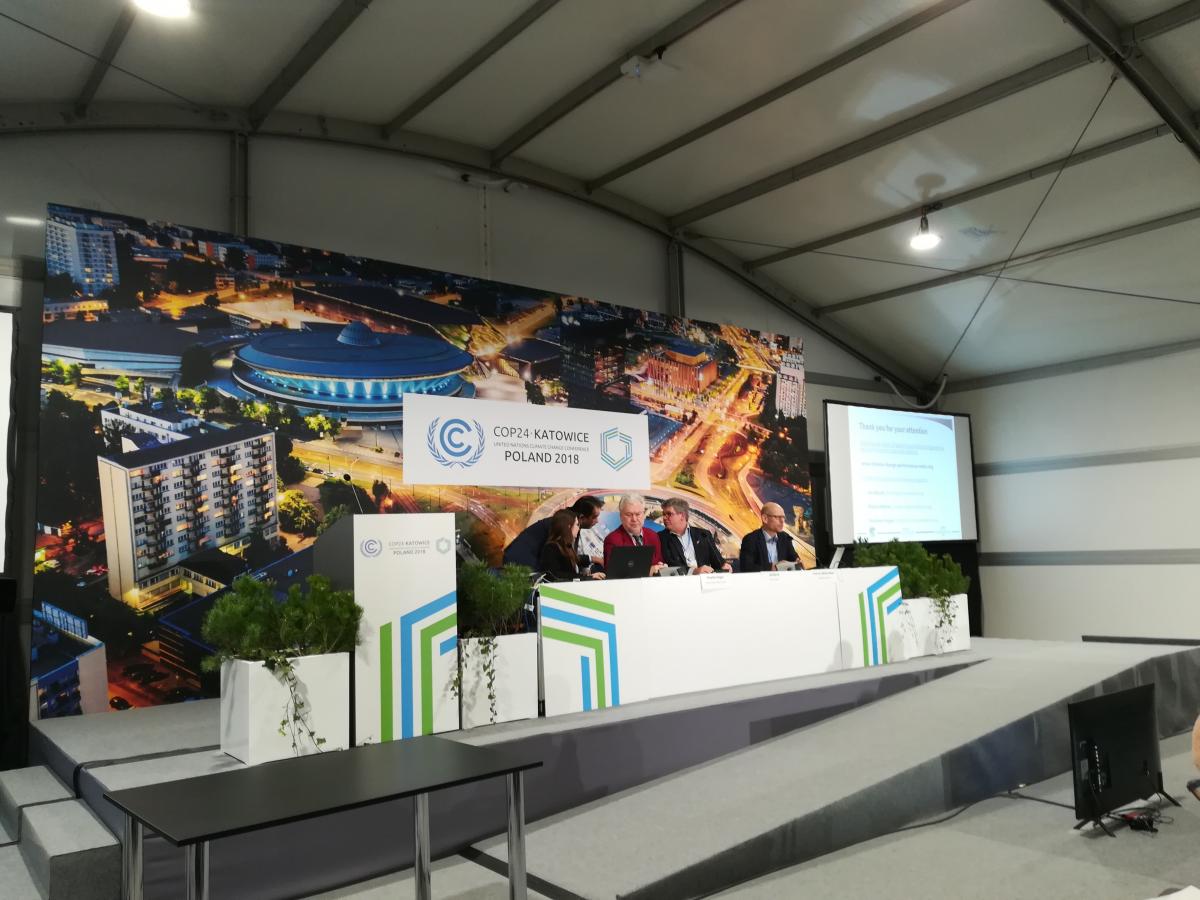
Germany falls in Climate Change Performance Index as it lacks coal exit and transport sector strategy
The political will to prevent dangerous climate change is missing in too many countries, said the authors of the latest edition of the Climate Change Performance Index 2019 by Germanwatch, Climate Action Network (CAN) International and New Climate Institute. Just like in 2017, “the top three are still unoccupied, because none of the 56 countries or the EU are clearly on a well below 2°C pathway in their overall performance.”
The report keeps track of efforts in combating climate change by 56 countries and the EU, which are together responsible for about 90 percent of global greenhouse gas emissions. The index ranks the countries by the categories: 1. emissions, 2. renewable energy, 3. energy use and 4. climate policy.
Germany fell from rank 22 last year to 27 in the 2019 edition. This relatively weak performance is due to stagnating greenhouse gas emissions for years, and a lack of important policy decisions, such as the country’s coal exit and a decarbonisation strategy for the transport sector.
“It is unacceptable that the decision of Germany’s coal exit commission has again delayed the release of a strong phase out plan for the country,” said Stephan Singer, Senior Advisor Global Energy Policies at Climate Action Network, at a press conference. “In absolute terms, Germany is the biggest emitter in the EU as regards to coal,” he added.
Jan Burck, climate and energy expert at Germanwatch, said there is another issue: “Germany is still a car country, and transport emissions have not decreased since 1990.”
Cannot sweep scientific findings of 1.5°C report under the carpet – German negotiator
Delegations in Katowice kicked off week two of talks at the UN climate change conference COP24 – a week that is “very important for the future of humanity”, as Jennifer Morgan, executive director at Greenpeace International, put it. “We’re moving into a very crucial stage in the negotiations and it is the crunch-moment for COP24 to start delivering the kind of climate action we’re in desperate need of,” Morgan said at a press conference.
The German delegation’s lead negotiator Karsten Sach said the goals of the first week had largely been reached by Saturday night, as the texts from many different negotiation groups had been handed over into the responsibility of the Polish COP presidency. All countries had negotiated constructively without blocking the talks – “that includes the US and Brazil,” Sach told journalists at a morning press conference.
Also on Saturday, in what Climate Home News described as a “moment of drama”, Saudi Arabia, the US, Kuwait and Russia had blocked UN climate talks from ‘welcoming’ the IPCC’s landmark scientific report on the effects of a 1.5C rise in the global temperature.
In this “little showdown”, a majority of countries had made clear the findings of the report “can't just be swept under the carpet,” said Sach. “As Germany, we are of the opinion - like almost all countries in the world - that the IPCC with its review mechanisms is the gold standard of international research and science. And we therefore want the 1.5 degree report to be welcomed and thus recognised as an important guideline for the work under [the Paris Agreement].”
The question is bound to be tabled again in this week’s talks. A source told Clean Energy Wire that many representatives at a meeting of the ‘High Ambition Coalition’ had signalled they were not willing to leave the issue alone.
“Breaking the vicious circle of disasters and poverty”
Climate disasters are responsible for “throwing back 26 million people into poverty each year”, said Maria Flachsbarth, parliamentary state secretary in the ministry for economic cooperation and development (BMZ) at a press conference. The climate risk insurance initiative InsuResilience Global Partnership of the German presidency of the G7 (2015) and G20 (2017) is supposed to support victims in cases such as crop failures after draughts or damages due to floods.
“The partnership is the central global initiative to increase the financial resilience of poor and vulnerable people and break the vicious circle of disasters and poverty,” said Flachsbarth.
Launched at the 23rd UN climate change conference in Bonn last year, the InsuResilience Global Partnership aims to increase resilience of poor and vulnerable people through climate and disaster risk finance and insurance. To this date, Germany has supported the initiative with 300 million US dollars. As an example of where money had already been paid out, the BMZ’s Director-General Ingrid-Gabriela Hoven mentioned rice farmers in the Philippines who had received 200 dollars each for crop failures.
In the long run, the idea is that the people insured pay the premium themselves, said state secretary Flachsbarth. “However, because they are often too poor, their governments should step in. As these governments are often too poor as well, donors like Germany must initially help out.”
Flachsbarth emphasised that the InsuResilience initiative is not intended to be a final answer to the loss and damage issue.

